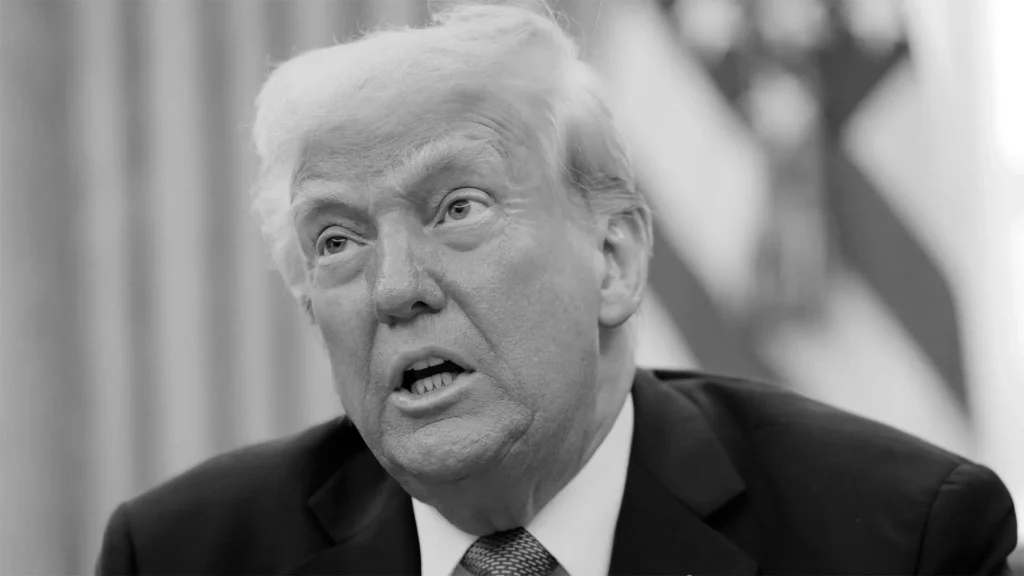A recurring poll showed entrepreneurs feeling even more negative in March, as business owners who previously cheered Trump’s promised tax cuts and deregulation focus on the increased costs created by his import duties.
MAR 24, 2025

President Donald Trump in the Oval Office. Photo: Getty Images
Entrepreneurs and their employees already know what new polling data is saying about their increasingly negative views of their economic prospects in the face of unpredictable tariff policies. The outlook among small-business owners continues to drop from its recent high in December, according to a recurring survey. That drop was driven largely by worries about the costs that President Trump’s import tariffs are creating for companies, and the economic and employment uncertainty that accompany higher prices.
The most recent data on the “Trump Slump” of small-business owner confidence came in the latest survey by The Wall Street Journal and executive coaching and peer advisory specialist Vistage. Balancing out positive and negative replies to six standard questions, the readings for March found the outlook of CEOs at modest-size companies plummeted from its December peak of 111.9 points to 85.4. That’s barely one point higher than the 83.3 level in August, just before surging uncertainty about the looming presidential campaign gave way to optimism about the prospects for the pro-business Trump’s election.
So what caused once surging business-owner confidence to sink in 2025? To a large degree, entrepreneurs, corporations, stock markets, and consumers all suddenly realized that Trump planned to actually impose the sweeping tariffs he’d campaigned on, despite economists’ warnings they’d reignite inflation and possibly tank economic growth.
Since taking office in January, the president has delivered on those promises, announcing 20 percent duties on products from China, and 25 percent levies on goods from Canada and Mexico — a trio of nations supplying 43 percent of all U.S. annual imports. Trump has also said he’ll slap similar taxes on other trading partners, creating extra costs and a rising sense of despair that small-business owners lamented in the recent Vistage poll.
“More than 40 percent said economic conditions had worsened compared with a year ago, up from 22 percent in February,” the Journal said. “(The) share of those who expect conditions to improve over the next 12 months has fallen by half to 27 percent since January.”
The poll also found nearly 70 percent of respondents expect negative consequences to their individual businesses from Trump’s tariffs. Just over half said those effects would necessitate rapid price hikes to customers, and 42 percent expected overall economic conditions to worsen — up from just 13 percent in Q4 last year.
Compounding those concerns, small-business owners don’t have the big cash reserves, easy access to credit, and leverage to negotiate discounts from suppliers that large corporations do to weather economic disruptions. As a result, many entrepreneurs have no option but to increase prices, cancel any investment plans, and consider ways to offset rising costs — including eventual staff reductions.
“There is only a limited amount of things we can do to reduce our costs,” John Glucksman, president of Los Angeles-based customized cap and headwear company Quake City Casuals, told the Journal. With sales having dropped by 40 percent already this year despite his efforts to limit the impact of tariffs on customers, Glucksman said he may have to make cuts from his staff of 45 if things don’t pick up very soon.
A similar outlook has left many of his fellow small-business owners feeling glum too.
The most recent Small Business Optimism Index, published by the National Federation of Independent Business, found its members’ outlook in February dropped for the fourth consecutive month, with concern about economic uncertainty rising to its second-highest level ever.
At the same time, the net number of entrepreneurs who expected the economy to improve fell to 37 percent — down from 47 percent in January, and 52 percent in December. As a result, the portion of respondents planning to hire new employees was limited to just 15 percent, down from nearly 20 percent in December.
“Following the high of the 2024 election, the introduction of tariffs has deflated the optimism of CEOs of small and midsize businesses,” wrote Vistage vice president of research Anne Petrik in comments on the poll. “Our latest research reveals that nearly 70 percent of CEOs expect negative impacts of changing tariff and trade policies, a major driver of increasing economic pessimism.”
But Petrik said the survey also revealed a concern among entrepreneurs that corporate executives and Wall Street investors share: Trump’s inconsistent information on the timing, levels, and targets of his tariffs, making effective planning by businesses almost impossible.
“While the tariff playbook has not changed, the uncertainty about when, where, and how these changes will impact makes planning challenging,” Petrik wrote. “The issue at hand may be tariffs, but the problem is uncertainty.”
Read the story: HERE